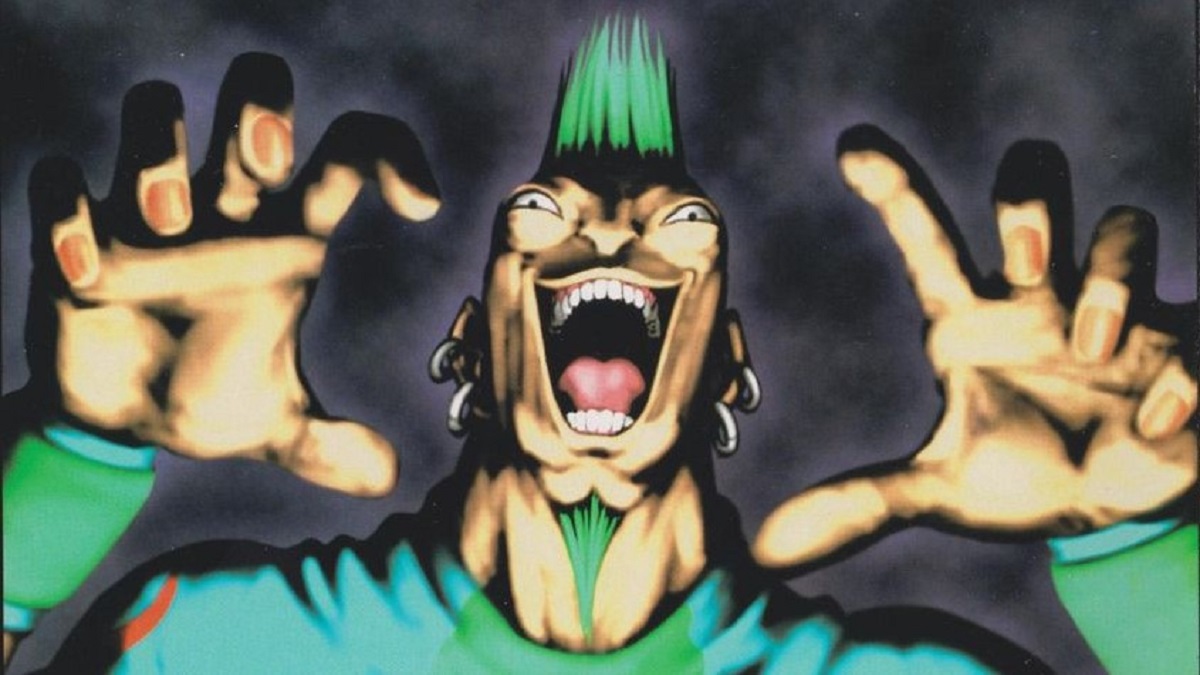I have to wonder if the fighting game boom of the ‘90s would have lasted longer if companies didn’t pump out sequels at such a dizzying pace. When you have Street Fighter Alpha 2 and X-Men vs. Street Fighter alongside Street Fighter III: New Generation and Street Fighter EX, what do you choose? These all came out in a roughly two-year span. The arcade mentality generally meant you dedicated yourself to a particular cabinet so you could dominate all competitors. A lot of people still weren’t willing to move away from Super Street Fighter 2 Turbo.
Of course, I wasn’t part of that scene at the time, so I’m kind of just talking out of my ass here.
But with that mindset, Bloody Roar 2 arrived just over a year after the first game. This was not at all uncommon. In fact, if Hudson didn’t have a new version of Bloody Roar available so soon after the last game, they’d be left behind by the Tekkens and the Virtua Fighters they were in direct competition with.
I don’t have to worry about that now. I just discovered the Bloody Roar series for myself. So I got to move on to Bloody Roar 2 when I was ready for it.
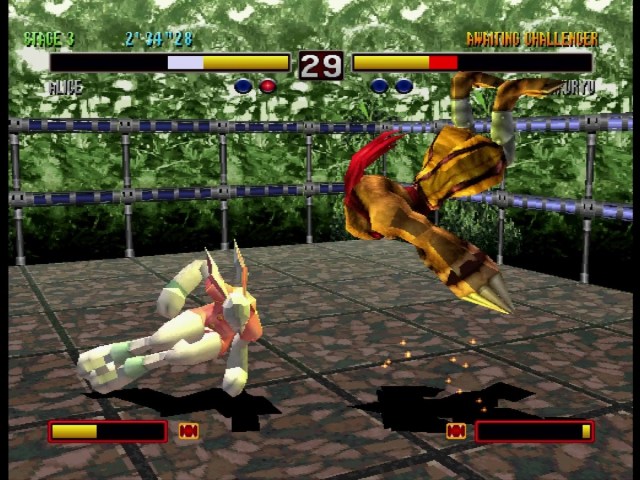
Fighting in flip-flops
Bloody Roar 2 is largely a refinement of the first game. However, a lot of big changes were made. Only four of the eight playable characters from the original roster return (technically five if you count Bakuryu). Seven are added, but two have to be unlocked, which roughly brings the roster up to 11 fighters.
Once again, these fighters have their regular human flesh mode, but during the battle, they can build up a gauge that allows them to transform into a furry. While some of the more interesting transformations from the first game, like Mitsuko the Boar and Hans the genderfluid Fox were removed, we do get Busuzima the Chameleon and Stun the “Insect.” You win some, you lose some.
The ones that do remain have had their movesets rejiggered. My main girl Alice lost easy access to her deadly spinning roundhouse, but she still has her Frankensteiner grab. Her roundhouse is now part of a combo (down-back+kick, back+kick) and isn’t quite as vicious. So, I instead made friends with her dropkick as a way of launching foes across the arena.
Also, Alice is like, a nurse now. But she doesn’t dress in scrubs. She has on what is essentially a sexy nurse outfit with thigh-high stockings and a skirt that is way too short to be throwing kicks in. I dunno, I’m not big on it. You can unlock a black alternate version that puts pants on the girl, but I still prefer her sportier look from the other games.
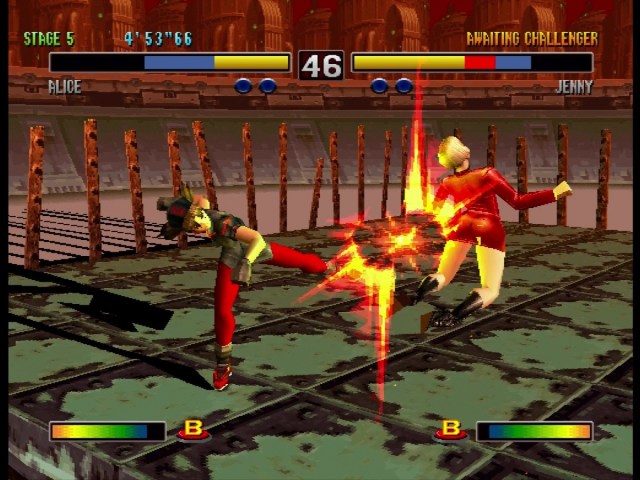
Return of the roundhouse
The general gameplay is the same. It’s an era-typical 3D fighting game, but the ring is boxed in with fencing. This is sort of like Sega’s Fighting Vipers. You can break the walls, but unlike the first Bloody Roar, which gave the option to have walls breakable just by knocking an opponent into them enough, they’re only breakable in Bloody Roar 2 when you finish off your opponent. Kind of a drag, actually.
However, they added the all-important block button. You can still do a “light guard” the same way as the first game by just not moving. However, heavy guard is now mapped to the R1 button. After playing so much of the original, it was heard to make my brain learn to use this in Bloody Roar 2.
Finally, Rave Mode has been replaced by a “Beast Drive” special attack. Each character has this super powerful move in beast mode. This expends beast mode immediately, which really sucks if you don’t manage to land the attack. However, it can also be a really flashy way to empty the rest of your bar if you’re about to get kicked back into human form.
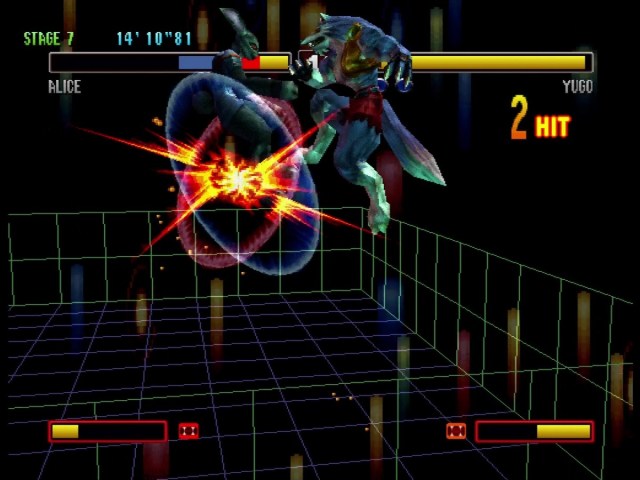
Furry rights
The biggest addition to the PS1 port is a story mode, but the narrative is, at least, very poorly told. The Tylon Corporation that made the zoanthropes was taken out in the first game. Now, there’s a Zoanthrope Liberation Front who claim to fight for furry rights, but are actually just following in the footsteps of Tylon.
However, each character’s story just has a lot of dialogue between fighters and serves as a really weak basis for them to fight. Alice’s story, for example, has her trying to help Yugo find Bakuryu, and then, for some reason, Gado decides she’d make a good leader and fights her. It’s the kind of story that is just kind of unremarkable and dumb, which is typical for a fighting game of the era. However, trying to describe it in shorter terms makes me want to vomit.
Still, a story mode is a great addition to add alongside the arcade, survival, and time attack. Fighting games are at their best when you have someone to compete with, but having ways for unlikeable people such as myself to get enjoyment is always appreciated.
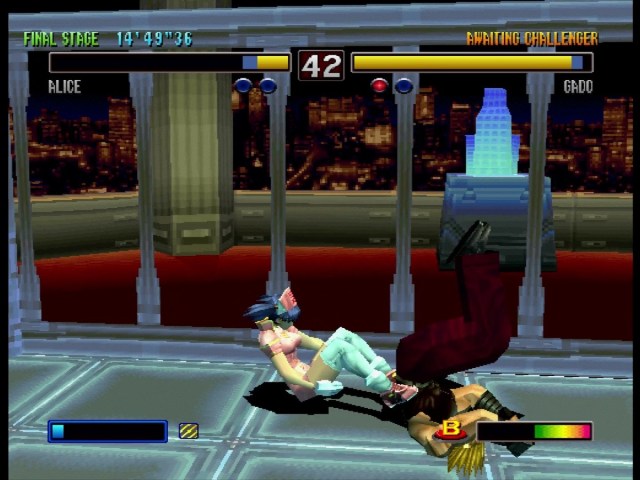
Come back when you’re ready
Aside from some give-and-take and a lame narrative, I don’t have any significant complaints about Bloody Roar 2. I wish it didn’t take me so long to finally try this series out because it has really clicked with me.
While I liked the simplicity of the first game, Bloody Roar 2 feels much more solid. Landing a deadly combo feels a lot more earned, and the strategy doesn’t lie solely on how well you manage your beast mode. I mean, choosing the right time to slip into your fursuit is still a big, big part of it, but it’s not quite as pronounced.
People have already been warning me that Bloody Roar 2 is where the series peaked. However, my local purveyor of retro games says it was Bloody Roar 3, while others have said Bloody Roar: Primal Fury. I haven’t heard anyone say Bloody Roar 4, so that’s worrisome. Unfortunately, I don’t have such easy access to any of the remaining titles in the series, so I’m going to have to take them as they come. Hopefully, Bloody Roar 2 is able to keep me satiated until then.
For other retro titles you may have missed, click right here!
